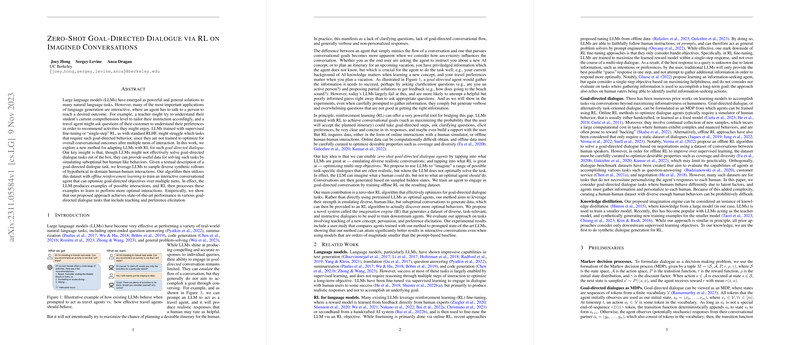Zero-Shot Goal-Directed Dialogue via Reinforcement Learning on Imagined Conversations
Introduction
The paper introduces a novel approach for training interactive conversational agents capable of goal-directed dialogue without requiring direct interaction data or extensive task-specific datasets. This method leverages the generative capabilities of LLMs to simulate realistic, albeit suboptimal, human conversations, which serve as the training ground for an agent optimized through offline Reinforcement Learning (RL). Highlighted through experiments on tasks such as teaching and preference elicitation, this research demonstrates significant advancements over direct prompting of LLMs or straightforward supervised learning techniques.
Methodology
The core innovation lies in the development and utilization of an Imagination Engine (IE), which synthesizes diverse and realistic conversations based on textual task descriptions. This engine operates through three distinct phases: reasoning, where it generates various personas; imagination, where it envisions dialogues involving these personas within the task domain; and critique, where it refines these dialogues to ensure they embody informative conversational dynamics. These imagined conversations, encompassing a range of human-like behaviors and outcomes, then form the dataset for training the conversational agent.
This methodology shifts away from traditional models directly trained on human-human interaction datasets or fine-tuned via online RL. The offline RL process applied to the imagined dataset aims to distill a policy that not only generates human-like dialogue but is also effective in achieving specific conversational goals.
Experimental Results
The paper presents a comprehensive analysis of the approach's effectiveness through user studies and simulated evaluations. These studies focused on comparing agents trained with the proposed method against baseline LLMs prompted to act as conversational agents. The findings revealed that agents developed with the IE and offline RL framework consistently outperformed the baseline across multiple metrics, including task accomplishment, naturalness of dialogue, and user satisfaction.
The evaluation underscored the proposed method's robustness, especially in handling scenarios poorly represented in the imagined dialogues. Agents could intelligently navigate conversations with unexpected human behaviors, demonstrating a deeper understanding of the task at hand and a greater capacity for adaptability compared to their supervised learning counterparts.
Implications and Future Directions
This research opens up new avenues in the development of goal-directed conversational agents, offering a scalable and efficient training methodology that leverages the existing capabilities of LLMs and the strategic optimization potential of reinforcement learning. This work implicitly argues for a reconceptualization of how conversational AI systems are trained, suggesting a model where LLMs act not as final systems but as foundational tools for generating rich, diverse training landscapes for subsequent RL-based optimization.
The potential applications of this approach are vast, spanning educational technologies, virtual assistants, and beyond. Moreover, the method's ability to produce competent agents without direct reliance on extensive human interaction data presents an opportunity for developing sophisticated AI systems in domains where such data is scarce or difficult to obtain.
Looking forward, this work paves the way for further exploration into automated task description processing, reducing human involvement in the training pipeline, and enhancing the efficiency of RL training processes. Additionally, investigating the incorporation of explicit user feedback into the imaginative and training processes could further refine agent responsiveness and adaptability.
In summary, this paper contributes a pioneering approach to training goal-directed conversational agents, marking a significant step forward in the pursuit of more intelligent, adaptive, and effective conversational AI systems.
